How to keep our rivers clean – leading a Wastewater Treatment Team
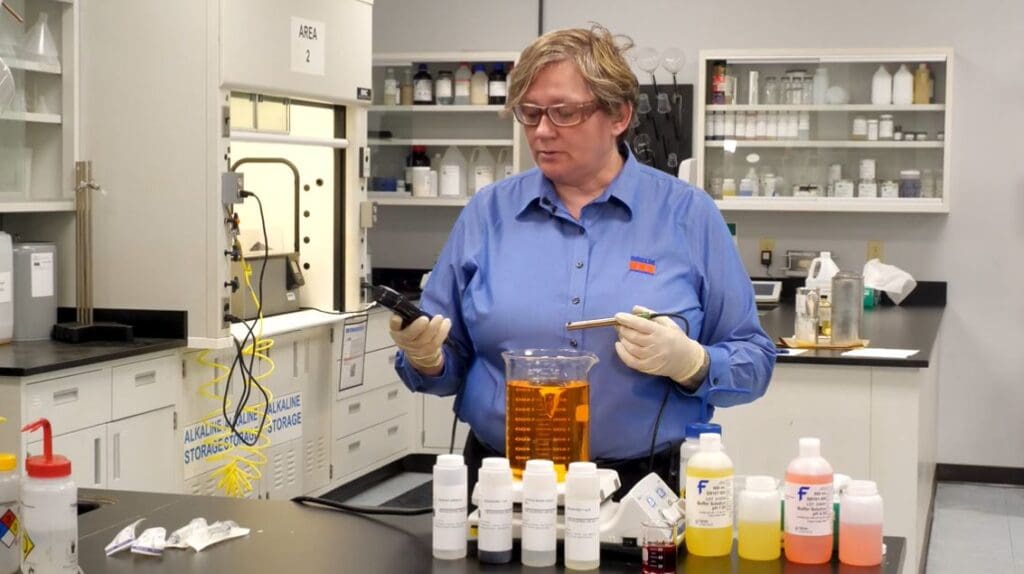

How to keep our rivers clean? Ever wondered who is out in the field making sure that river water stays pure?
Robin Deal has many years of experience in making wastewater safe. The textbook definition of a “water quality protector” has resonated with her throughout her career:
“to protect the many users of receiving waters.”
In her current role, she educates many Water Quality Protectors and helps them understand the importance of what they do and how their success impacts individuals, companies, and entire communities.
Robin is the Vice Chair of the local American Water Works Association.
Keeping our rivers clean – Robin Deal leads a team of Wastewater Treatment Specialists
Robin works for Hubbard-Hall.
Founded in 1849, Hubbard-Hall is the oldest independent chemical distributor in the US. Our experts help manufacturers reduce cost, complexity and chemical consumption with process efficiencies and product innovation in cleaning, metal finishing and wastewater treatment. We are a progressive and reliable partner to over 2,300 companies across many industries.
What is a wastewater system to keep our rivers clean
Firstly, the basic need for wastewater treatment, regardless of what type of system it is, is to remove harmful contamination from wastewater. Following that process, it can safely be released back into the environment or recycled back into usable water.
This is done in numerous ways.
Original wastewater systems
Original wastewater systems consisted of water running over rocks that supported a bio film for removal of the contaminates. We still see this natural treatment system when we go to creeks, rivers and lakes. That slime layer that grows on the rocks is a living bio film that actively works to keep our waterways clean.
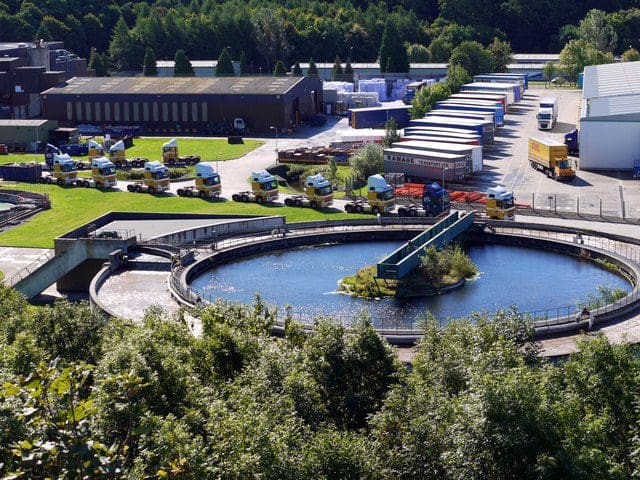

Incorporating nature into systems
We took what nature gave us, the bacteria, and incorporated it into our wastewater systems. For example, cities and some industries use bioaugmentation to remove contaminants such as phosphorus, nitrogen, BOD (biological oxygen demand), COD (chemical oxygen demand) and FOG (fat, oil and grease) from wastewater before discharge.
Chemistry
For more toxic contaminants such as heavy metals we rely on chemistry to assist with the removal.
Metal finishing industry
I specialize in the treatment of wastewater generated by the metal finishing industry. This wastewater can have anything from cyanide to hexavalent chromium in it depending on the processes employed to make the final metal piece, be it a screw that holds your glasses together or the bumper of your car. Metal finishing is a huge industry that is dedicated to improving the manufacturing process so that they make as little negative impact on our waterways as possible.
Background
Could you give a brief description of your background and what led you to work in wastewater treatment?
I was working for a large hand tool manufacturer in their pack department. While, I was in the position of team lead when I realized I did not like the long hours, dealing with the high turn over of the team, or the never-ending line of parts to be packed.
There was a posting on the internal job board for a Wastewater Treatment Operator, no experience needed. I signed up for the job and was the first female wastewater operator that facility ever had. When they announced they were shutting the plant down, Hubbard-Hall INC offered me a job as their Field Service Technician focusing on industrial wastewater out of the South-Eastern United States. I jumped at the chance to see different wastewater systems as well as help manufacturers solve their wastewater challenges.
Were there any childhood interests which were a factor?
Not really. I always loved science and chemistry. The added bonus of helping our environment just sealed the deal.
Typical day leading a team to keep our rivers clean
What’s your typical day like?
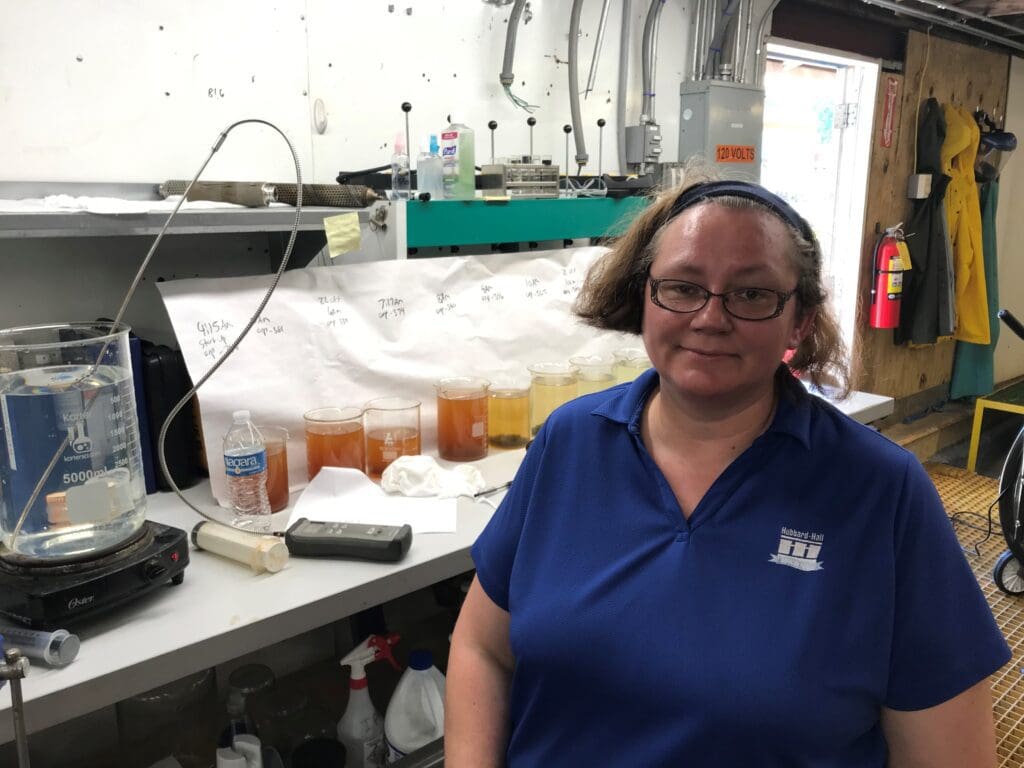

My days depend on if I am:
in the office
at a trade show
at a customer
or teaching a class.
If I am in the office, I start my day with coffee and emails. Office work is never very exciting.
Tradeshows are always fun and exciting as I get to meet new people and catch up with friends in the industry.
The most exciting days are when I get to go to a customer and help them solve a wastewater challenge. My day runs on their schedule. I get to see a wide variety of wastewater systems and treatment options. No two systems are exactly the same. You have to stay on your toes and keep up to date with changes in how wastewater is treated.
How much of your time is spent ‘hands on’ with customers and how much team leading or training?
I manage a small team of myself and two other field service engineers, or Technical Application Specialists, as we call them. We have weekly one on one talks, bi-weekly video meetings, and quarterly in-person meetings to ensure we are all still working toward the same goals. We also use this time to discuss new technologies, or problems we have seen that we have not encountered before.
Job scope leading a team of wastewater treatment specialists for keeping rivers clean
What sort of companies do you work with?
We work primarily with manufacturers who have some form of metal finishing. This includes aerospace, automotive, fasteners, ammunition, and hand tools. We also work with food manufacturers and some paper manufacturers.
What exactly do your field service team do to keep rivers clean?
We are called in when a company is struggling with a wastewater challenge. They may find they need to upgrade their wastewater system, or they are struggling to stay compliant with their discharge permit regulations, or they are adding processes that will impact their wastewater system. My team evaluates the situation. We determine what needs to be done to solve the challenge. If it a system upgrade, or a chemical change, or just tweaking the process by fine-tuning the controls, we make the recommendations and work with the company to achieve their wastewater goals.
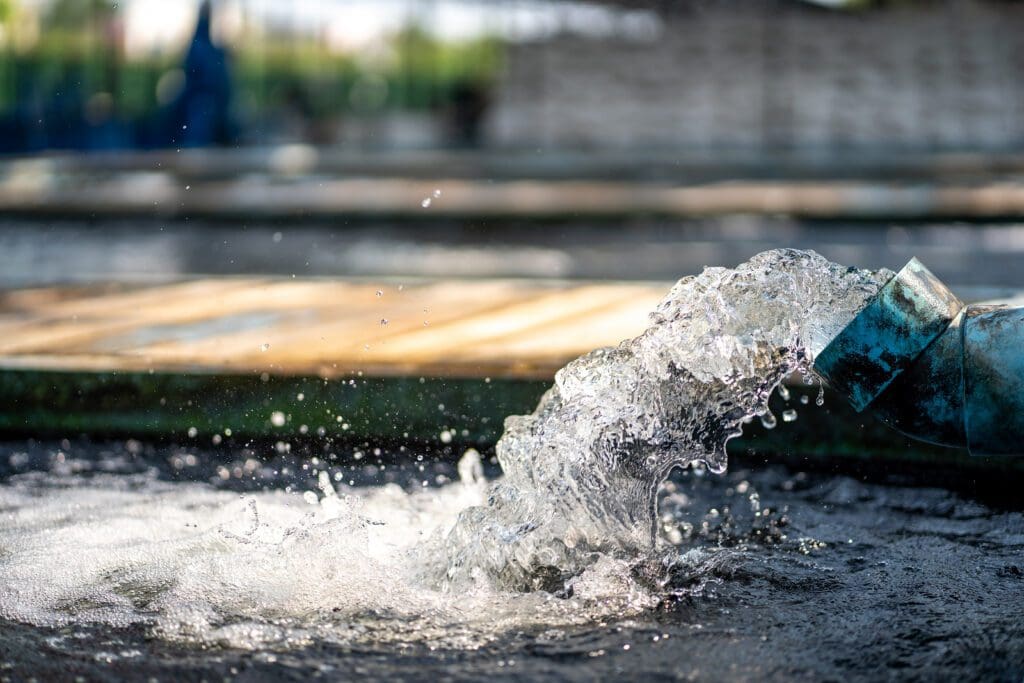

Most challenging part of the job in keeping rivers clean
What is the most challenging part of your job – technical side, people management or customers?
People management has been the most challenging for me. You must have a mindset of leader, not boss. A leader guides their team, supports their team, and helps their team grow as individuals and as a team. Every person is unique and requires different motivation. Moving from co-worker to leader made me readjust my way of thinking. Thankfully, I have a great mentor, a great CEO, and a great team.
What has been your most challenging job to date?
Moving from operating a wastewater system to working for a company that helps multiple types of manufacturers run their wastewater systems was a challenge.
Before, I only had to know the system that my previous employer had, and I worked with every day. Now, I must know multiple systems and their requirements at the drop of a hat. I have to be able to pivot from lab work to field work. Plus, I have to keep up with where my team is and what they are working on.
How do you explain technical issues to non-technical people?
It is important to remember that technical jargon always has equivalent layman terms. An expert in the field should be able to navigate between the two types of speech. I once had a customer tell me they would believe I knew what I was talking about, and trust me, if I could turn their wastewater problem on and off to show them what it was. That was their way of telling me using technical jargon did not impress them at all. I loved the feeling I got when I was able to do this for them.
Making a future star as a wastewater field service engineer
What sort of personality traits are ideal for a wastewater field service engineer?
A universal trait of all wastewater operators is they are very laid back. They do not get worked up over the little things, they are easy to get along with, and they all love to have a good time. Field service engineers are no different. They should have the same attitude and be willing to roll with the punches as they say.
Apart from a strong technical background, what are the three most important skills to have?
Listening is a skill everyone needs to have. So many people listen to hear what they want to hear, as opposed to listening to hear what the other person is communicating.
Communication is vital. If we cannot communicate, we cannot solve problems efficiently.
Critical thinking skills are also something field service engineers must have. There is not always someone you can call to tell you what to do. Being able to evaluate the situation quickly and determine the steps needed to fix the issue quickly is the difference between stopping a spill of millions of gallons of contaminated water or having to put out a public health notice because the water sources have been contaminated.
Leading and managing a team to keep our rivers clean
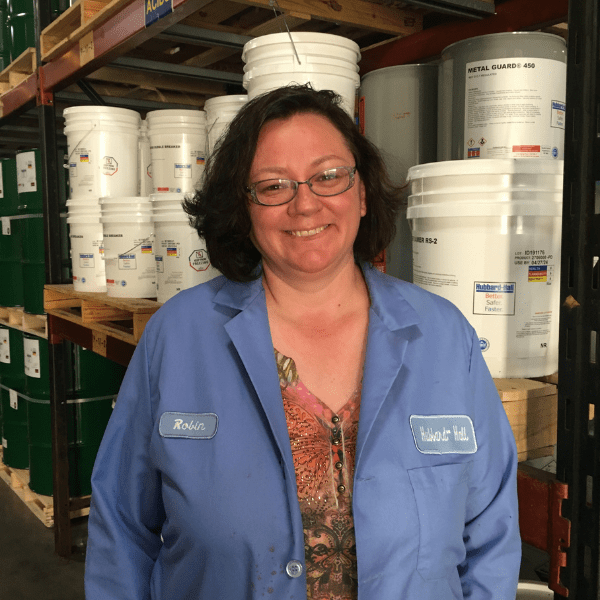

How important is it to remain hands-on?
It is very important to my team that we all stay in communication with each other. Our customers depend on us to help them when they need us, so if someone is on vacation, we must be able to cover them. For myself, staying hands on allows me to gauge where my team members are. It keeps me up to date on what our customers value. I also find that it allows me to stay active and not go too far down one road and forget about the others.
How do you motivate your team of service engineers?
Thankfully, my team is full of passion and drive. Motivation has not really been an issue for us. I do ask wastewater questions at random times. We do team building activities together, and we talk honestly about the challenges we are facing.
Supporting your team
How do you improve confidence in those who need it?
Building confidence in someone else is not always easy. It takes time. I start by helping them set small attainable goals that they can feel good about accomplishing. Reassurance that they know what they are doing when they need it is helpful. And first and foremost, giving them the room to do their job. Micromanaging someone is the worst thing you can do. Be there as a resource when they need help, but not interfering is critical.
How do you support someone in your team when things have gone wrong because of a mistake?
Mistakes happen. Own up to them. Trying to deny a mistake happened is the worst thing a person can do. Once you acknowledge the mistake, you must start trying to remedy it. You cannot dwell on why it happened or what you should have done differently. Apologize, fix it, and learn from it so that it does not happen again. When mistakes happen, we take the appropriate steps, and then we only mention for lessons learned. Once it is corrected, we may do a root cause analysis to determine why it happened. We learn from it.
Global warming
How is global warming affecting your company and your customers?
Manufacturers are looking for ways to recycle not only wastewater, but chemistry used for cleaning and finishing parts. Green chemistry is being explored more now than ever before. Carbon footprint reductions are at the forefront of many corporate plans.


Are people more aware of the environmental impact of wastewater?
I believe they are. We are more aware of our impact everywhere.
How much wastewater could be recycled?
In theory, all wastewater can be recycled. Is it economically feasible for the majority of the world right now? Not really.
Favourite river
What is your favourite river?
The South Fork River aka South Fork Catawba River is one of my favourites to visit as a family:
https://www.carolinathreadtrailmap.org/trails/trail/south-fork-river-blueway
https://www.scpictureproject.org/york-county/catawba-river.html
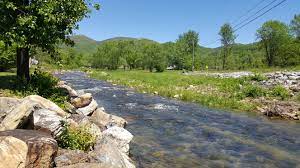

Interested in rivers – further information
Interested in rivers, read more here:
https://waterfootprint.org/en/
Further reading
Who repairs all the wind turbines you see everywhere?
The positivity of the rise of women in engineering


Responses